With the recent launch of our remote MCP server, anyone can now chat directly with Ahrefs data to get actionable SEO insights.
MCP, which stands for Model Context Protocol, is an open standard that companies can use to integrate their external tools and data with compatible AI assistants.
Imagine you’ve recently launched a new clothing brand and want to find eCommerce stores ranking well for the types of products you’ll sell— a common goal before reverse-engineering what makes them successful.
The standard Ahrefs interface enables you to look up any site to uncover things like the keywords they’re ranking for, their most linked-to content, and how overall search traffic is trending.
Our new MCP server, which integrates with popular AI assistants like ChatGPT and Claude, offers the ability to automate these and countless other processes to gain insights at scale.
Ask for advice as if you’re talking with a friend and, in this case, we now have a list of potential competitors to start investigating further.
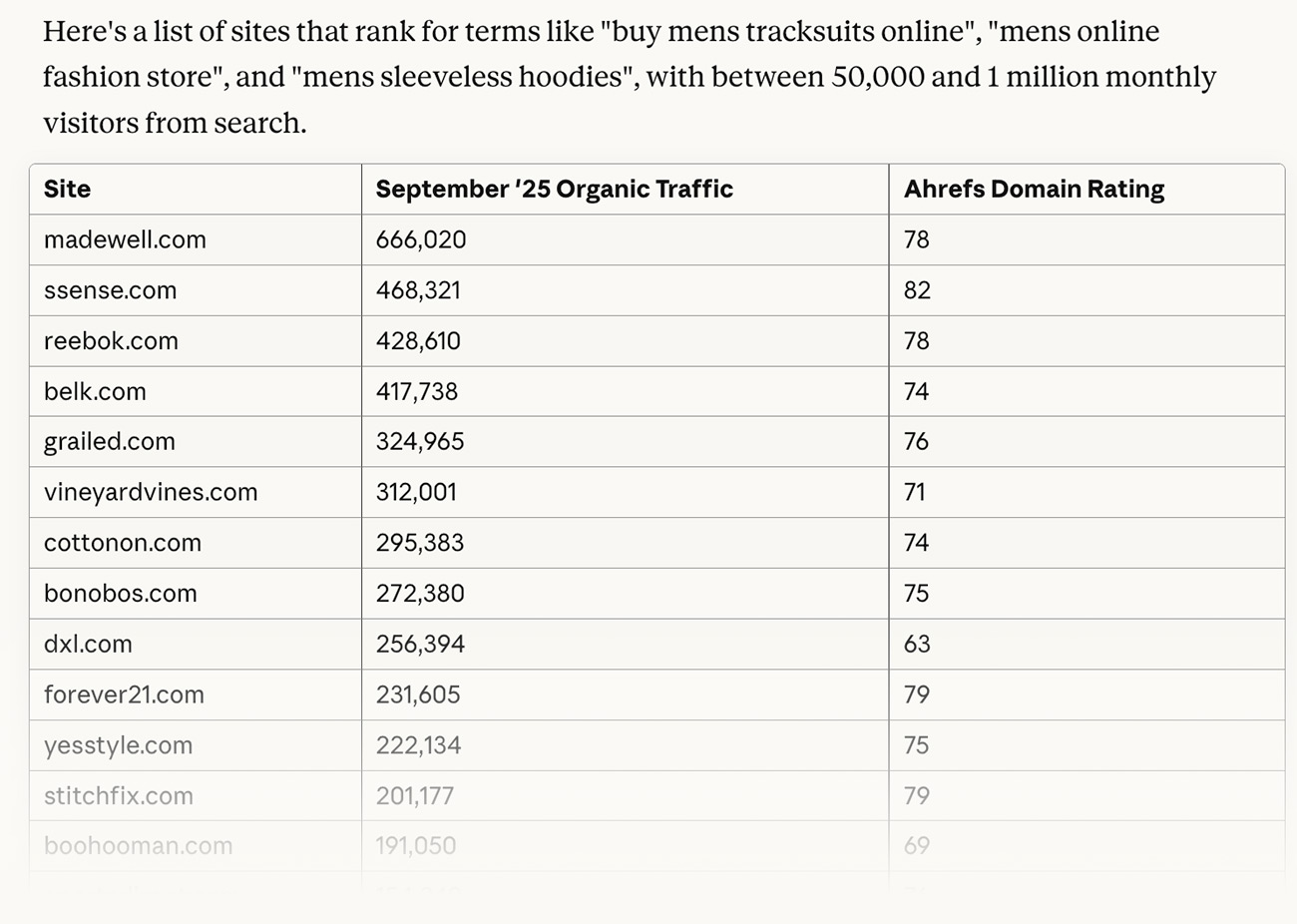
Available on Ahrefs Lite, Standard, Advanced and Enterprise plans, you’ll now be able to tap directly into our API without needing to know how to code.
The only problem you might face is, “What should I ask next?”.
This guide aims to answer that very question.
Whenever I’m working on SEO projects for clients, I typically use multiple tools to perform similar tasks.
For example, I crawl websites using the Ahrefs Site Audit tool, Screaming Frog, and custom software.
My process for keyword research includes Ahrefs, Google Trends, Google Autosuggest, and manual checks of search results.
I learned early on that some of my best insights come from having multiple perspectives on related data. When you’re working on sites with tens of thousands or even millions of pages, it’s possible to miss finer details in one tool that stand out in another.
I view using the Ahrefs MCP server in a similar way: I gain new insights thanks to a different perspective that AI provides, and as a bonus, it enables me to scale operations that I already know how to perform.
It won’t (and shouldn’t) fully replace all manual checks and human intelligence.
At times, you’ll receive recommendations you’re already aware of, and like many AI assistants, it might make things sound simpler than they are in reality.
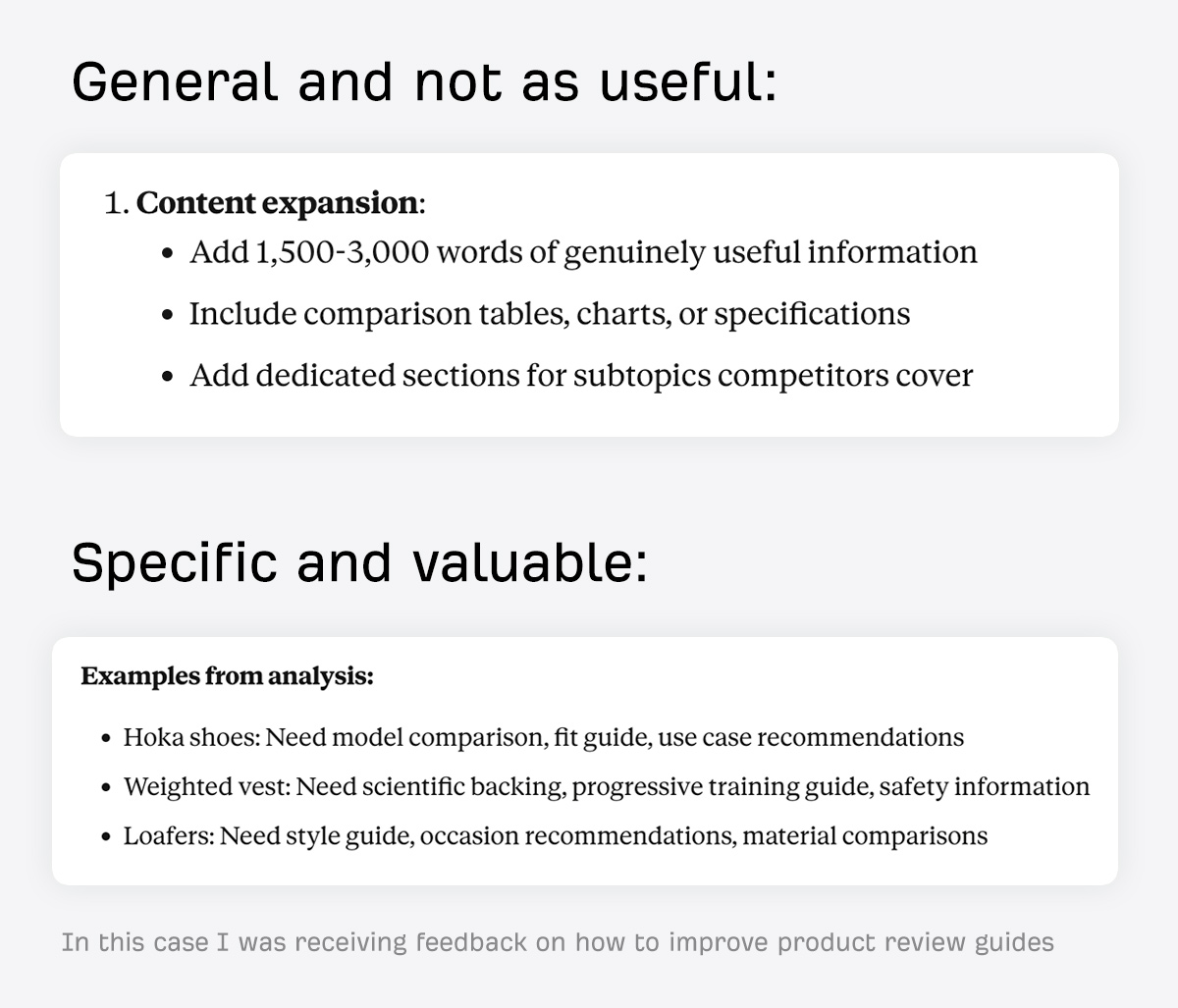
But it can also tell you about a cluster of uncommon keywords a site is ranking for that sparks an idea of how you can compete with your own take.
It will remind you that specific rankings a competitor has picked up are seasonal, and that it might be good to prepare content for the traffic “peak” coming in a few months.
It will inform you about the small niche site you initially overlooked which has ramped up content production in recent months and, from an SEO perspective, is getting results.
And if you’re still not convinced, chatting directly with Ahrefs data is just plain fun.
A note on set-up and prompting
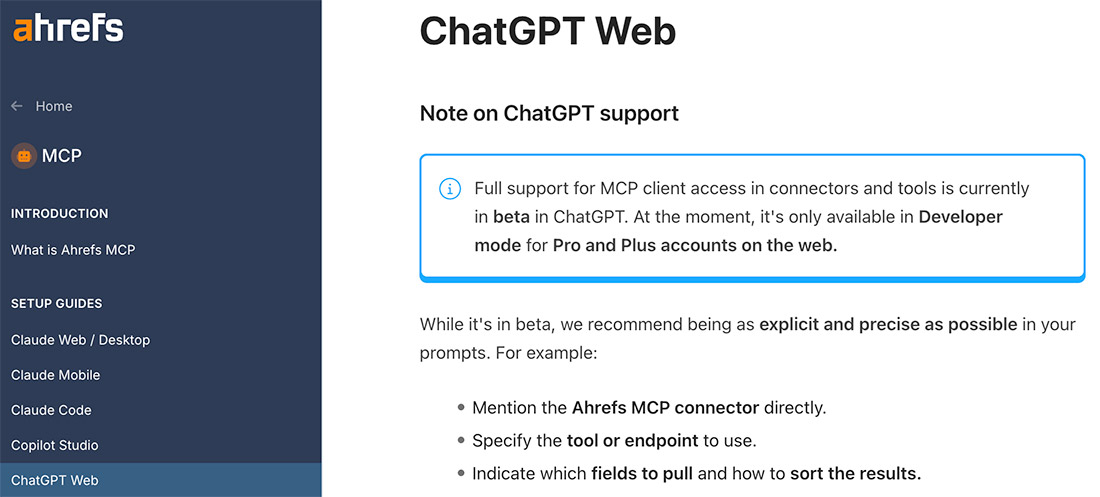
There are guides to five popular AI tools including Claude, ChatGPT, and Microsoft Copilot Studio. Alternatively, you can use our remote connection URL directly: https://api.ahrefs.com/mcp/mcp.
While you can get the same great functionality from the ChatGPT integration as Claude, MCP connectors are in beta in ChatGPT, and that’s noticeable at times.
I say this as a paying ChatGPT customer for years and a Claude one for just a few weeks, I much prefer the experience in Claude.
Tools don’t always know to use the Ahrefs MCP server versus searching the web, so it’s highly recommended that you’re specific about that, starting requests with “Use the Ahrefs MCP server” or “Using the Ahrefs MCP server,…”.
Assume that I may have had to add that to the following prompts if they didn’t route through the Ahrefs MCP connection automatically.

As a final note, your Ahrefs account level determines how many rows you can pull back for each request.
15 prompt ideas across three levels of insights
Simple prompts can provide actionable responses in seconds, while others that require more data (such as analyzing the backlink profile of multiple sites) can take a few minutes to process.
Generally, the more in-depth your request, the more units you’ll consume and the longer it will take to finish your response.
Response time: typically under two minutes.
1. Identify sites growing organic search traffic in 2025
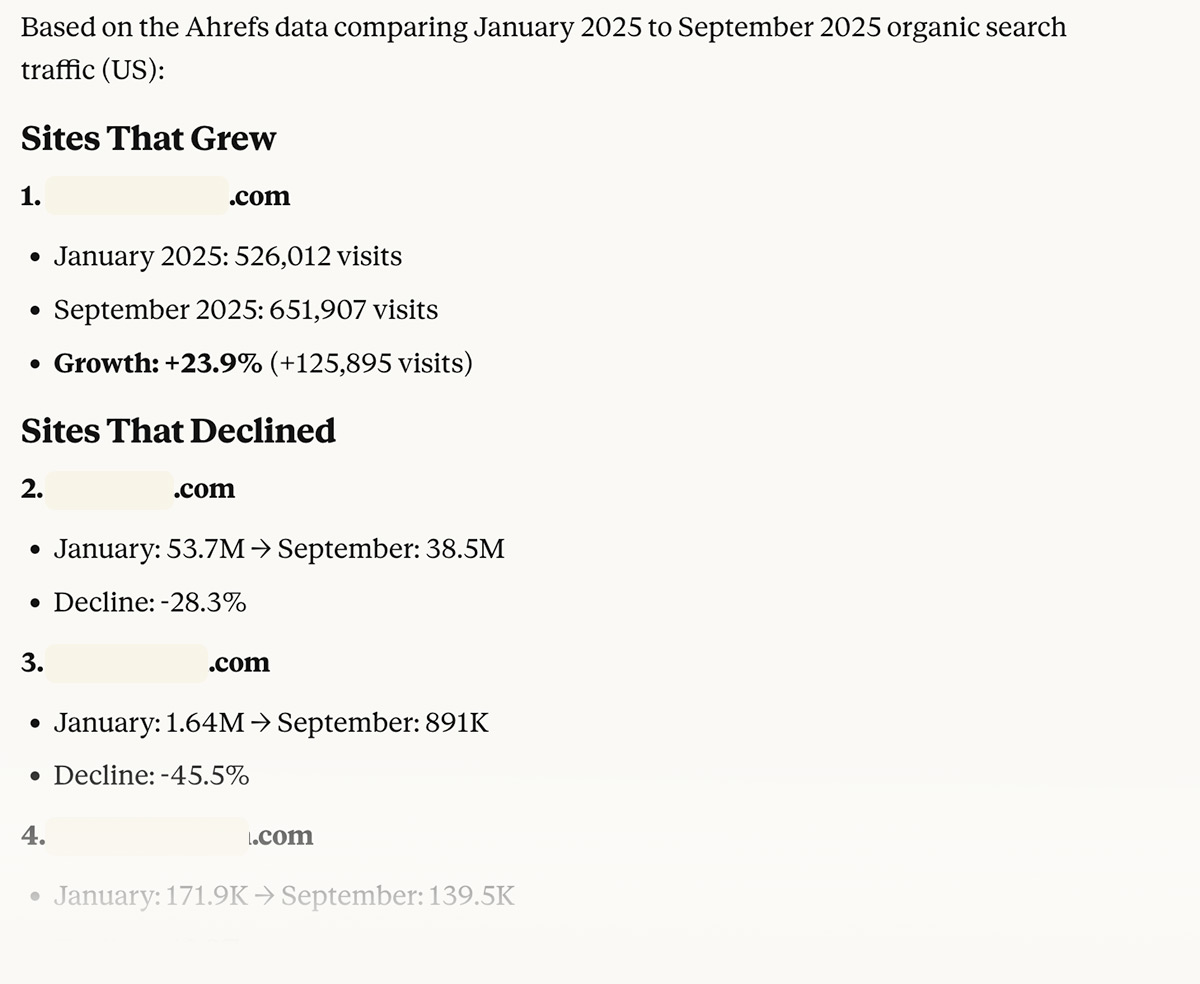
Note: This is just one part of the answer. Specific sites in the response are hidden to be respectful.
Prompt:
Using this list of 10 sites in my niche, tell me which have grown organic search traffic from January 2025 to September 2025:
[Domains 1-10].
Your AI assistant will quickly look up the estimated organic search traffic each site received over the suggested timeframe.
It will also likely add commentary on overall growth percentages and any interesting stand-out months for a particular domain.
2. Discover the terms competitors rank on the first page of Google for
Prompt:
Tell me about the rankings
[Competitor]has on the first page of Google that[My Site]doesn’t have first-page rankings for.
To approach this manually, you could use Ahrefs’ Competitive Analysis tool, with numerous specific filters to hone in on what you’re looking for.
If a simple overview is all you need, the MCP will quickly list terms you’re not ranking for compared to any competitors.
3. Find the most linked-to content on any site or subfolder
Prompt:
List the top 10 pages on
[industry blog]ranked by how many links each has. Also include their estimated organic search traffic.
I like to look up how specific directories are performing — not just domains as a whole. For instance, finding the most linked-to articles on Ahrefs.com/blog/ provides very different insights from the overall Ahrefs website.
4. Find organic search competitors for any site
Prompt:
Give me a list of the closest organic search competitors for
[My site, e.g. Docusign.com].
The Ahrefs API has a specific endpoint that shows organic search competitors ranked by the number of common keywords each site shares. We can use the MCP to tap into that.
In the example above, if we’re researching Docusign, we’ll get insights on sites like PandaDoc and SignWell.
You can perform this action manually in the Ahrefs Dashboard by going to Site Explorer > Organic Competitors.
5. Combine keyword research with blog post headline ideas
Prompt:
My business sells
[product type, e.g. coffee tables], and I’m looking to research more blog post ideas. Help me find keywords that people use for research before making a purchase.
This prompt will pull data directly from Ahrefs’ keyword database, looking up informational, comparison, question-based, and similar query types relevant to your specific scenario.
Response time: typically 2-10 minutes.
6. Uncover trending keywords (and why they’re growing in popularity)
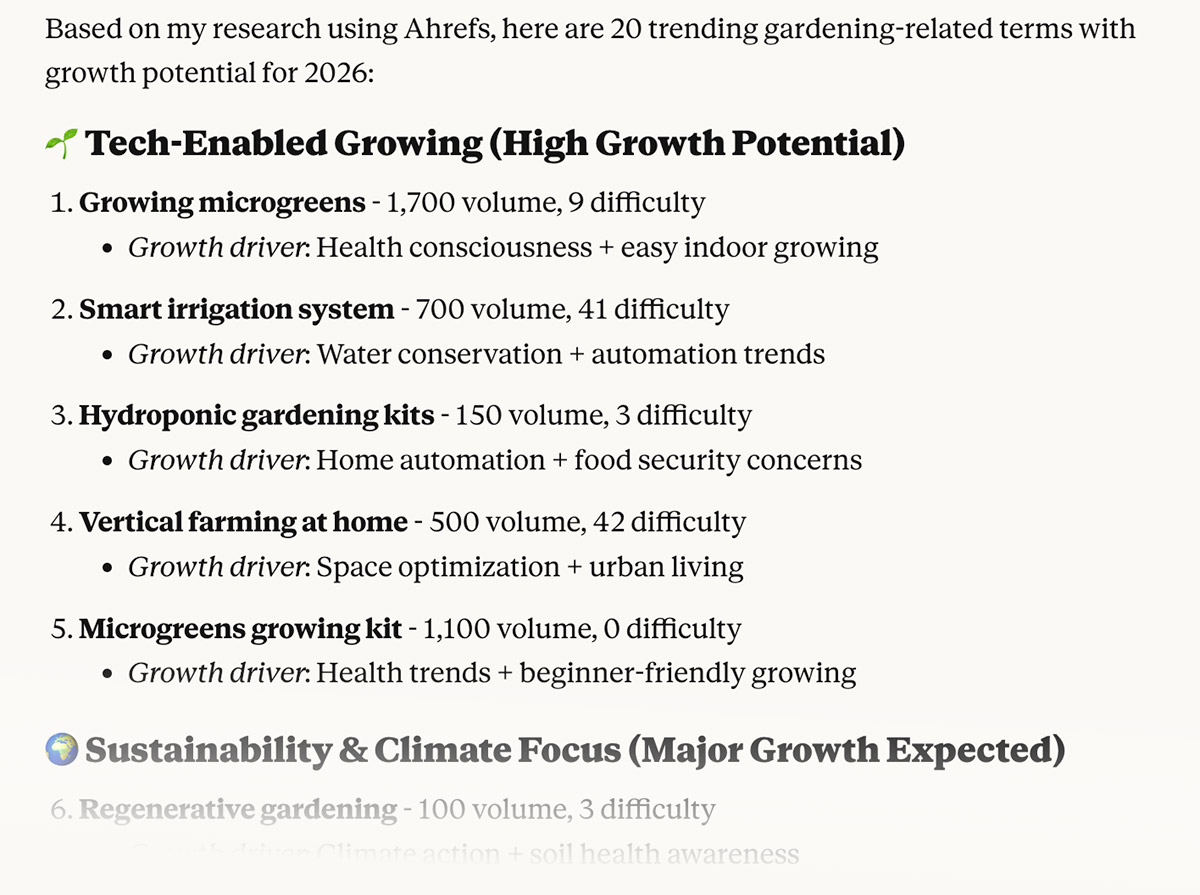
Prompt:
I’ve covered
[my niche e.g. gardening]with a lot of evergreen content angles. Are there any trending terms closely related to my industry that you could recommend considering? Preferably up to 20 terms with the potential to increase in popularity in 2026.
The MCP can utilize Ahrefs Keyword Explorer to analyse relevant insights for each keyword, such as search volume over time, traffic potential, and keyword difficulty.
I specifically like the descriptions as to why a term might be increasingly popular.
7. Batch analyze specific domain insights (like Organic Traffic and Domain Rating)
Prompt:
Here’s a list of 20 sites in my niche
[attach a file or type each domain]. Please create a table that includes their Ahrefs DR, Organic Traffic, and the number of keywords they’re ranking in the top 3 positions for in search results.
It’s often the case that I’ll have a list of sites to dive into, discovered through research outside of Ahrefs, on which I now want additional SEO-focused insights. The MCP helps to provide these at scale.
8. Structure content outlines using insights from keyword research
Prompt:
I’m writing a guide on
[topic, e.g. the best travel backpacks]. Conduct keyword research to help identify key terms I should cover, then structure an example article outline using your findings. Keep it natural, rather than overly keyword-focused.
Combine keyword research with an AI assistant’s understanding of how articles are typically structured.
Our AI Content Helper can take this to the next level, but the MCP can provide a great starting point.
If you like, you can also request an analysis of top-ranking pages for relevant queries.
9. Discover the top-ranking sites across any group of keywords
Prompt:
Across this list of 20 different keyphrases relevant to my niche, tell me which sites rank for the most terms and in the best positions.
[Include your keyphrases]
This prompt is great for quickly discovering the top sites in niches you aren’t already familiar with.
10. Find broken backlinks to any domain or URL path
Prompt:
Find broken backlinks pointing to any URLs under the following subdirectory:
[e.g.nytimes.com/wirecutter/]. I’m specifically looking for individual URLs that receive the most links from other sites but don’t exist. Focus on high DR links, and just one per domain.
This prompt provides direct insights from the Broken Backlinks report we offer in Site Explorer. If you’re familiar with the filters we have in place (like only returning One link per domain), then you can easily enhance your prompts with more specifics.
Response time: two to 10+ minutes. The bigger the request (i.e., the more keywords, search results, or sites to analyze), the longer it will take.
11. Research international SEO expansion opportunities
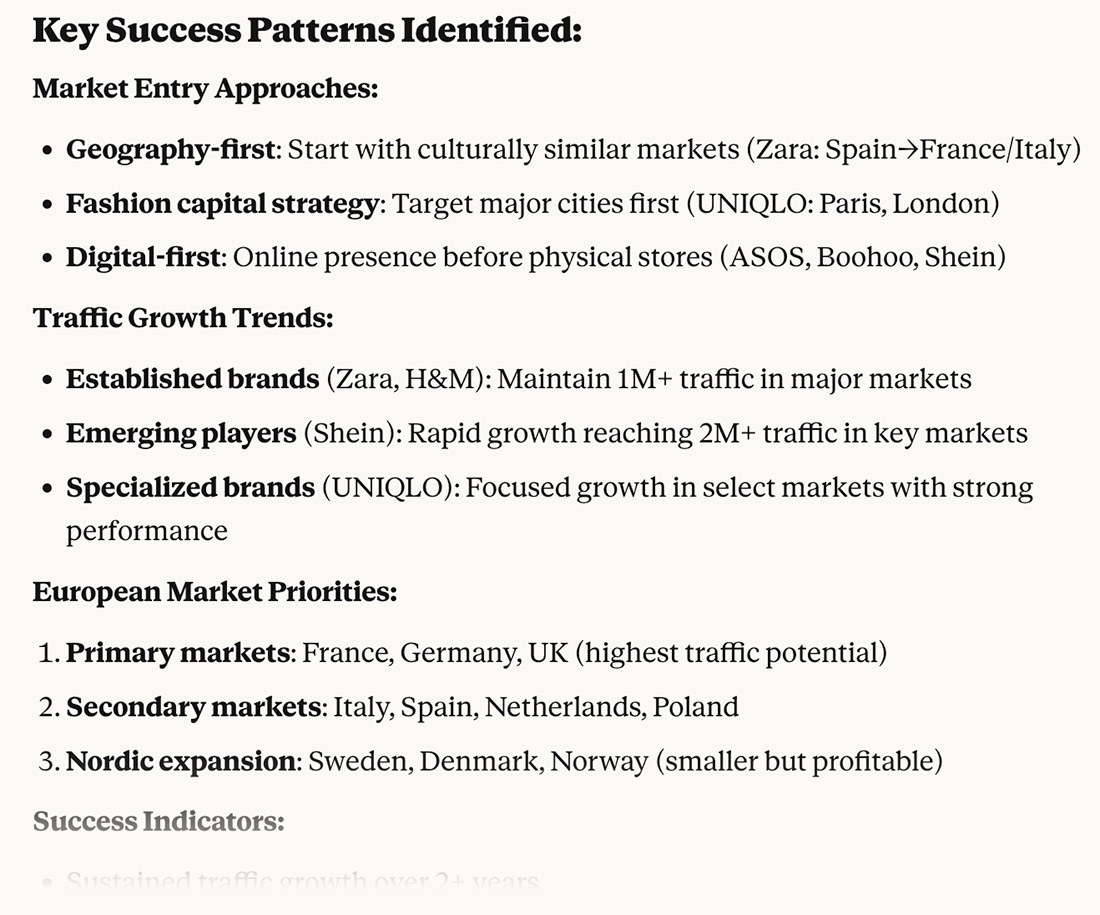
Prompt:
I run a
[business type, e.g. fashion marketplace]primarily for the US market. We’re looking to expand internationally. Please find up to 10 examples of similar businesses that expanded into other countries. Outline what they were, and how their organic traffic is trending in those countries.
The goal here is to identify the countries where competitors are ranking well, and the markets they haven’t targeted, to initiate the research process for future business decisions.
In this example, the MCP quickly checked international search traffic for brands such as UNIQLO, Shein, H&M, ASOS, Nike, and Mango.
12. Insights into competitor content strategies
Prompt:
Analyze the top ten organic search competitors to
[Site e.g. AllRecipes.com]. I want to get an idea of any unique, non-standard approaches they’re taking to content creation and the terms they’re targeting, outside of[common topic, e.g. recipes].
The aim here is first to discover the content strategies across multiple sites, then strip out the commonalities to reveal any interesting outliers.
13. Overall site recommendations to increase organic search traffic
Prompt:
You’re an SEO expert. Your job is to increase organic traffic to
[Site, e.g. Chewy.com]in a legitimate, whitehat way. You have access to the best SEO data on the planet via the Ahrefs MCP. Research the most relevant information you can about my site and the industry in which it operates. Offer any advice you feel is appropriate.
This example was inspired by Marie Haynes, who kindly messaged me (with permission to share) to say she was gaining some great insights from prompts along this line.
I think it perfectly fits into the ‘fun’ category, where it’s not super obvious what kind of response you’ll get, but potentially identifies something you might have overlooked.
14. In-depth industry research based on specific rankings
Prompt:
Provide a list of the top 20 keyphrases that
[Site e.g.GarageGymReviews.com]is ranking first-page for, where the ‘People Also Ask’ SERP feature is present. Rank them by estimated search volume. Only include terms at least four words in length, and exclude any that are branded (i.e.,[mention ‘Garage Gym Reviews’]). Then tell me the top ten sites ranking overall for those terms combined.
Here we start by identifying rankings that only one site has, then use those terms to gain a different perspective on organic competitors.
You can request other SERP features to be present, such as Videos or ‘Discussions & Forums’.
The idea is that you can combine two (or more) separate angles into a single request.
15. Analyze multiple backlink profiles at once
Prompt:
Provide me a comprehensive overview of the backlink profile of these five websites I’m researching:
[Sites 1,2,3,4,5]. Be sure to include the rate at which they’re picking up links from new domains.
I specifically like knowing how quickly competitors are picking up new backlinks compared to my own brands.
Analyzing multiple sites at once helps you form a good overview as to where you stack up. You can build on this by adding more sites or requesting specific types of links (e.g., excluding those that are nofollowed).
Available now: A bonus prompt via the page explorer endpoint
The Ahrefs development team constantly adds new features to our API, and when they do, you can also gain additional insights via our MCP server.
We’ve just released the Page Explorer endpoint in APIv3 (technical details here), which provides page-level details from any websites you’ve audited with Ahrefs.
You can first use the Ahrefs MCP server to get a list of issues that apply to your most recent Site Audit crawl:
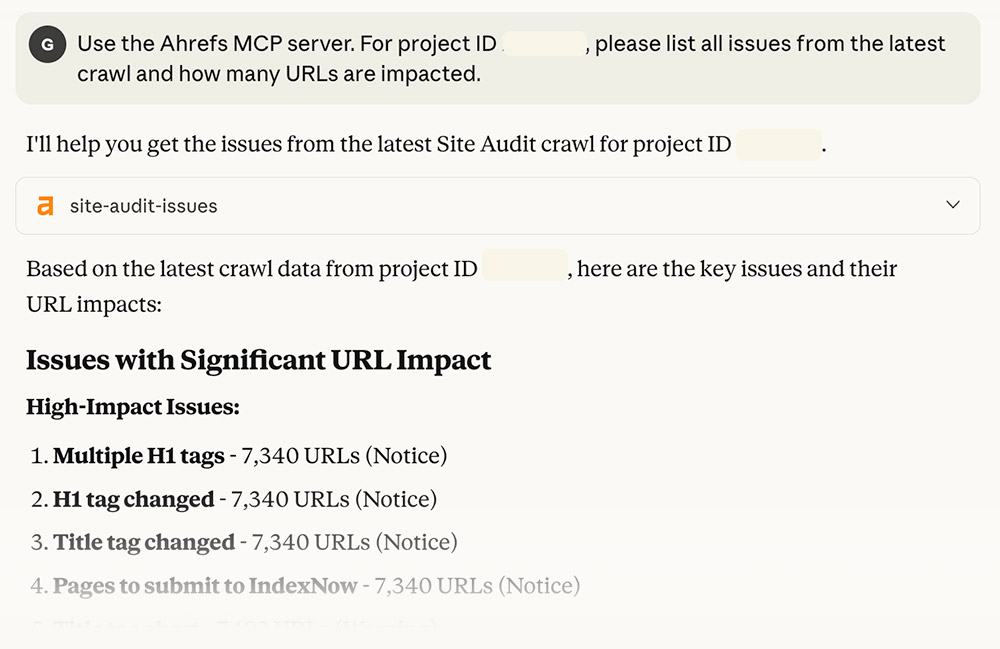
From there, you can use the new endpoint to explore specific issues, such as which URLs redirect, or all pages that returned a 404 status code.
Having spent a lot of time with the MCP testing creative ways to improve my workflows, I’ve learned a few things to make the experience more valuable.
Once connected, try asking your AI assistant of choice for inspiration on what to prompt.
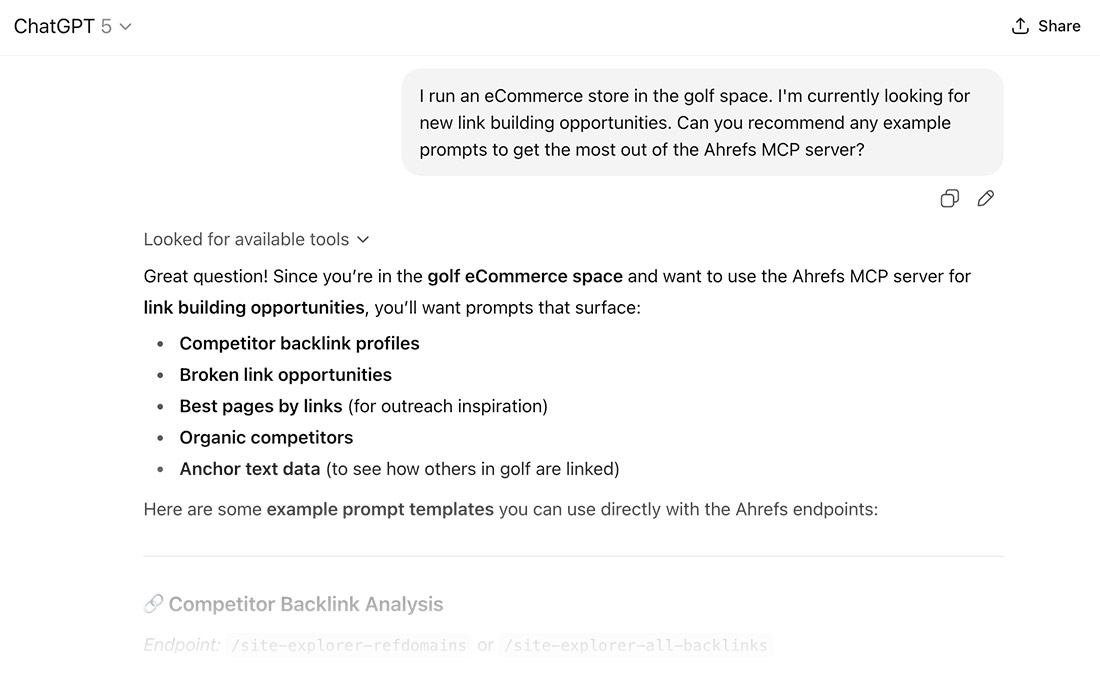
This sounds meta, but it works: Explain the current situation of the projects you’re working on from a marketing perspective and what you’re struggling with. You can then see some example prompts which might help with what to ask.
Especially for ChatGPT, make sure you mention the Ahrefs MCP server in your prompts.
As an example, a request for something around the top blogs in a specific niche can quickly trigger your AI assistant of choice to start searching the web.
Including “Using the Ahrefs MCP server, please list the top blogs ranking for…” in your prompt will ensure it collects data directly from Ahrefs instead.
Be specific about the number of sites you’re looking to analyse, keyword suggestions you would like, and the date range you want insights from.
This way you can avoid getting too few insights, or too many that you consume unnecessary units.
While ChatGPT connectors are in beta, I’ve personally found Claude to be a more enjoyable experience.
I prefer ChatGPT’s design, but not when it comes to calling tools (like the Ahrefs MCP server).
If you’re already familiar with a process to follow, be clear about the order of the task you want your AI assistant to follow.
If you typically look up the keywords a site is ranking for before you analyze its backlinks, prompt your assistant to do the same.
If you encounter any oddities (they’re rare), you can inspect the response to gain an idea of what might have gone wrong.
ChatGPT’s own documentation recommends this step to help debug any issues. It may be the case that your prompt could be improved, or you’ve asked for something we don’t have data on (like where a site ranks in DuckDuckGo).
You can easily check your current usage and limits via the Ahrefs dashboard.
Simply navigate to Accounts > Limits & Usage and scroll down to the API units / mo section.
Don’t expect the MCP to replace all human intelligence (or our typical interface), but see it as an addition to those.
Some tasks are always going to be more enjoyable in a purpose-built UI than in a chat-like interaction.
But when scale and a new perspective are what you’re looking for, you might just wonder how you worked without the MCP before now.
Wrapping up
I didn’t initially expect to enjoy using the MCP server as much as I have. Now that it’s here, I keep finding new use cases to gain insights and increase productivity.
On a personal note, I’m honored to be writing my first-ever blog post here after recently joining the company.
I’ll be working with the Ahrefs marketing and product teams to help tools like this one (and everything else in the pipeline) be as valuable as possible.
If any additional use cases or requests come to mind, I would absolutely love to hear them. Reach out to me on LinkedIn or X, and I’ll see what we can do.

